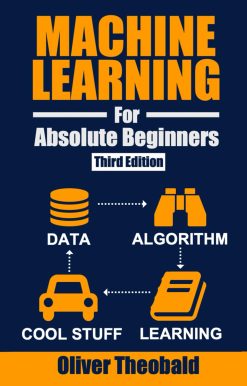
Formula 2+2: The Simple Solution for Successful Coaching
16.00 JOD
Please allow 2 – 5 weeks for delivery of this item
Add to Gift RegistryDescription
In today’s fast-paced business environment, frequent feedback and “course correction” is absolutely vital. But about the only time most managers offer employees feedback is during scheduled (and generally infrequent) performance appraisals, which tend to be stiff, formal, and—whether intentionally or not—adversarial, and therefore ineffective. Formula 2+2 offers a simple yet powerful approach to revolutionizing feedback conversations. It details the five secrets of effective feedback: Timeliness Balance Focus Specificity Follow-up Formula 2+2 shows how to foster a culture of continuous feedback which increases the effectiveness of the manager, protects the spirit and dignity of employees, and provides a systematic approach to reinforcing and improving employee performance.
Additional information
| Weight | 0.29 kg |
|---|---|
| Dimensions | 1.48 × 14.46 × 22.38 cm |
| PubliCanadation City/Country | USA |
| Author(s) | |
| Format | |
| language1 | |
| Pages | 120 |
| Publisher | |
| Year Published | 2004-10-10 |
| Imprint | |
| ISBN 10 | 1576753107 |
| About The Author | Douglas B. Allen is associate professor of management at the University of Denver Daniels College of Business. He is also a guest professor at Renmin (People’s) University Business School in Beijing, China, and a visiting professor at Tongji University in Shanghai, China. He received his doctorate from the University of Michigan, a masters of business administration from Harvard, and a bachelor of science degree from the University of Zimbabwe. Previously, Doug worked as a human resource management specialist at Chrysler World Headquarters and as an international placement consultant at the Bahá’í National Center. He has consulted with and conducted training programs for many organizations, including Amoco, Boeing, Chrysler, General Electric, Honeywell, Nokia (China), and Tata (India). Doug has published articles and makes frequent presentations on management in China, globalization, human resource management, and cross-cultural and diversity issues, as well as the 2+2 feedback system to a wide variety of conferences and organizations. He has made thirty visits to China and has lived, traveled, and/or worked in over forty-five other countries in Africa, Asia, Europe, and the Americas. Dwight W. Allen is Eminent Scholar of Educational Re- form at Old Dominion University and has developed educational reform initiatives for more than forty years. At Stanford University he was director of teacher education and helped develop an award-winning internship program. As dean of education at the University of Massachusetts he helped develop over twenty simultaneous teacher training programs to explore the relative efficacy of a variety of theoretical models, one winning an award as the outstanding program of the year from the American Association of Colleges of Teacher Education. At Old Dominion University he cofounded the PRIME program in Norfolk Public Schools involving many systemic change initiatives focused on teacher empowerment. He has served as a consultant to more than one hundred national, state, and local school authorities. Dwight has worked with UNESCO, where he was found- ing chief technical advisor for the first National Teacher Training College in Lesotho and was technical advisor for in-service teacher training programs in Malawi and Namibia. It was in Namibia that the idea for 2+2 was first developed. For the past eleven years, he has served with the United Nations Development Program as chief technical advisor and international ad- visor for the largest UNDP education programs in China. Dwight is the author of nine books on educational reform and teacher education, the latest of which is American Schools: The 100 Billion Dollar Challenge (with Bill Cosby). He has visited China over twenty times and has lived, worked, and/or traveled in over sixty countries in Africa, Asia, Europe, and the Americas. |
“If you think managing and evaluating employees is frustrating, time- consuming, and exhausting, then read this book—right now! You will find out how to help employees be more productive, and you'll help them to learn at a faster rate. And your own job might become more satisfying in the process. While you're at it, buy a copy for your boss." —Dorothy Marcic, Vanderbilt University, author of Managing with the Wisdom of Love "The most practical book I have read since One Minute Manager. On a single plane flight I learned a system that I can begin using tomorrow. This book should become a standard reference for those searching for a better way of managing and coaching." —James M. Theroux, Flavin Professor of Management, Isenberg School of Management, University of Massachusetts "In Formula 2+2, Doug and Dwight Allen have taken a not-so-simple cybernetic concept and transformed it into an effective, memorable, actionable process. That's no small accomplishment and managers, their organizations, and their employees are the beneficiaries. Here's a book as useful to CEOs as it is to first-line supervisors." —Jim Griesemer, Dean, Daniels College of Business, University of Denver "Formula 2+2 addresses one of the most difficult human resource management challenges facing Chinese managers: giving effective performance feedback to employees without causing a loss of face. This balanced approach encourages direct feedback with a constructive spirit." —Xu Erming, Dean, School of Business, Renmin University of China, Beijing“ Formula 2+2 adds a powerful tool to the construction managers’ ‘toolbox’ as they seek ways to coach their employees and hold them accountable for doing a great job.” —Chuck Shinn, President of Lee Evans Group Management Seminars for Homebuilders “At Starbucks we learned that providing regular feedback through the 2+2 system was far more effective than traditional performance review cycles.” —Kerry Plemmons, Former Regional Manager, Starbucks |
|
| Table Of Content | Foreword by Ken Blanchard Introduction by Bill Cosby Prologue 1: The Unguided Missile 2: Performance Appraisal: Like a Trip to the Dentist 3: The Trip to the Dentist 4: Celebrate Success and Encourage Improvement 5: The Magic of Balance 6: The Importance of Timeliness 7: The Spirit of 2+2 A special message from Buzz Aldrin, astronaut, Apollo 11 8: The Power of Focus 9: Getting 2+2 Up and Running 10: The Need for Specificity 11: 2+2: Take Two 12: The Integrated Follow-Up 13: Creating a Sustainable 2+2 Program 14: Epilogue: Two Years Later Authors’ Final Note The Secrets of 2+2 Pauline’s 2+2 Preparation Checklist Acknowledgments About the Authors |
| Excerpt From Book | INTRODUCTION BY BILL COSBY Though I’ve never really thought about it before, Formula 2+2 has led me to realize that I’ve depended upon feedback and encouragement all my life. I know that if people ever stop laughing, I’m in trouble. Take my concert performances for instance. The live audience is all about feedback. The spontaneous laughs, applause—even the occasional jeer—all tell me whether I’m on track and getting my message across. The real-time feedback I rely upon is frequently missing from the workplace. In many organizations, the only feedback you can count on is the annual evaluation, and it is almost always stale news by the time you get it. “Speedy” feedback is defined as semiannual or quarterly appraisal—not much better. Too often, the little feedback offered is feared, not welcomed. In comedy it’s the other way around. It’s the immediate and positive feedback that keeps you going. When the laughter stops, you know you have to do something different—and fast. Comedy involves lots of improvisation. Even tried-and-true routines are adapted to the audience in real time—you need to respond to the moment. Isn’t it obvious that the workplace should encourage a similar response to the moment? But that’s pretty unrealistic if immediate response means as soon as possible—after the semiannual review! That’s why this book is so important. If you take it to heart, its message can change your whole attitude toward feedback. I have seen firsthand how this can happen. At the University of Massachusetts, where I was a doctoral student, Dwight Allen created a school of education that lived and breathed feedback and encouragement. The results were amazing, and that same spirit is captured in this book. Dwight and his son Doug have woven a fine story, telling of the current woes and bright hopes for feedback and encouragement. If you follow their lead, you will be able to engage in great feedback conversations—with your employees, your colleagues, even your family! The 2+2 concept sounds simple: a balance of compliments and suggestions given on a regular basis. It is simple, but not that simple. The trick is in the delivery. When I was a kid, we knew that when Grandma gave us “the look,” the feedback we were getting was anything but balanced. All too frequently, feedback in the workplace sure feels like “the look.” Formula 2+2 can help you replace “the look” with a balance of compliments and suggestions. If my audiences just sat there, satisfied but not laughing (or even worse, giving me “the look”), I would soon be looking for new material—or a new audience. Receiving compliments can help prepare us to hear the more difficult things. It makes us comfortable about what we are doing right—and eager to do more. Suggestions provide us with the opportunity to improve—en route to receiving even more compliments. You’ll like what Doug and Dwight say; and I like the way they say it. The next time you are tempted to give someone “the look,” try using 2+2! BILL COSBY, ED.D. |
| series | The Ken Blanchard Series – Simple Truths Uplifting the Value of People in Organizations |
Only logged in customers who have purchased this product may leave a review.





Reviews
There are no reviews yet.